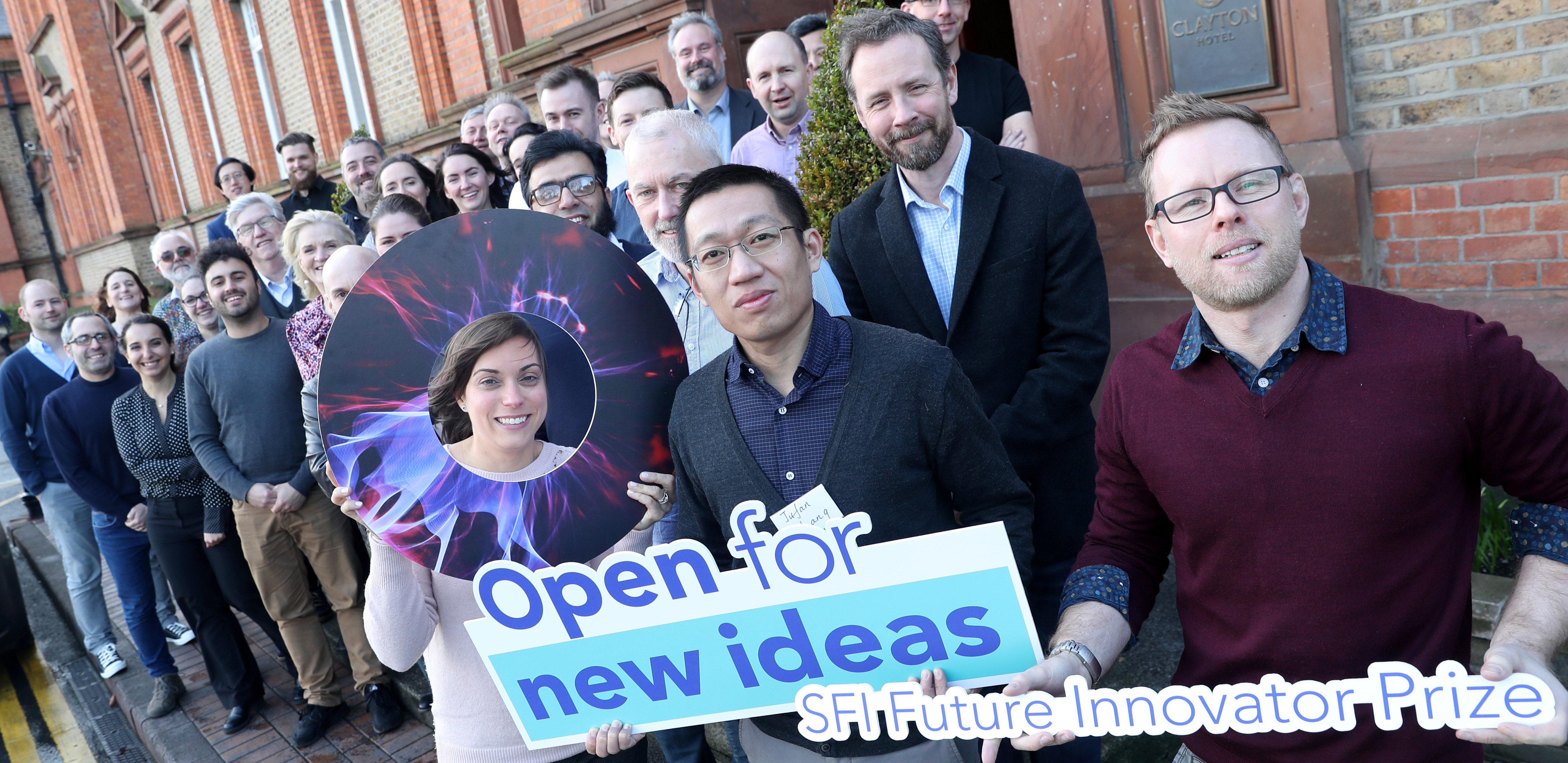SFI Future Innovator Prize contenders announced

Teams from UCC are in the running to win the €1 million SFI Future Innovator Prize, a new challenge-based programme which calls on researchers to develop innovative approaches to societal challenges facing Ireland.
The SFI Future Innovator Prize challenges the country’s best thinkers and innovators to create novel, potentially disruptive technologies in collaboration with societal stakeholders and end-users.
Five teams will be shortlisted in April and the winning team, to be announced in December, will receive the €1 million prize.
I’m delighted to lead the team focused on minimising waiting-lists in the Irish health service. @UCC @UCCResearch @UCCCS https://t.co/wQt7d8QqR8
— Barry O'Sullivan (@BarryOSullivan) February 25, 2019
Minister of State for Training, Skills, Innovation, Research and Development, John Halligan TD, said: “The excellent standard of the projects demonstrates the importance of continuing to implement competitive and challenge-based funding in the Irish ecosystem, which will ensure that obstacles which impact the everyday lives and the future of our citizens are addressed in novel ways. I want to congratulate each of the teams for succeeding to this phase of the competition, and to wish them all the very best of luck with the next stage.”
The 12 projects aim to address problems including sustainable manufacturing, reducing the impact of packaging, novel technologies for life sciences and medicine, improved outcome for patients of such illnesses as cataracts, osteoarthritis, cancer, Epidermolysis bullosa (EB) and sepsis, minimisation of mining emissions and the cost of electric vehicles, pain management, and improved healthcare delivery.
Competing teams are from Trinity College Dublin (TCD), University College Dublin (UCD), Dublin City University (DCU), NUI Galway (NUIG), University College Cork (UCC), Institute of Technology Carlow (IT Carlow), and Tyndall National Institute (TNI), as well as a number of world-leading SFI Research Centres.
The challenge areas to be addressed are:
- Minimising Hospital Waiting Lists and Optimising Healthcare Capacity
Prof Barry O'Sullivan and Helmut Simonis (School of Computer Science and Insight Centre for Data Analytics, UCC); Dr Jane Bourke (Economics, Technology Adoption and Health Care Innovation, UCC); Prof Martin Curley (Director, HSE Digital Academy)
Project - An artificial intelligence and data analytics system for minimising hospital waiting lists and optimising healthcare capacity in Ireland
- Enabling Better Breast Cancer Diagnosis
Dr Eric Moore (Analytical Chemistry, TNI/UCC); Martin O'Sullivan (Lead Surgeon, BreastCheck Southern Unit and UCC); Liosa O'Sullivan (Patient Advocate)
Project - Development of a technology for clinicians to improve the breast cancer diagnostic pathway through real-time point of care detection of breast disease.
- Reducing the Environmental Impact of High-Tech Surfaces Manufacturing
Team: Dr Eoin Flynn (Materials Chemistry, UCC); Dr Paul Young (Biochemistry and Cell Biology, UCC); Dr Keith Alden (AMBER SFI Research Centre, TCD)
Project – Designed Environmentally Sustainable Thin-Films Utilising Renewable Biopolymers (DESTURB)
- Creating Next-Generation Personalised Orthopaedic Implants
Team: Prof Rocco Lupoi (Mechanical and Manufacturing Engineering, TCD); Prof David Hoey (Biomedical Engineering, TCD); Patrick Byrnes, (Research and Development Manager, Croom Precision Medical)
Project - Genetic algorithm aided optimisation of the mechanical structure of orthopaedic implants for revision‐free life cycles
- Reducing the Burden of Sepsis
Team: Dr Elaine Spain (Analytical Chemistry, DCU); Dr Kellie Adamson (Diagnostics and Therapeutics and Biomaterials Science, DCU); Prof Gerald Curley, (Sepsis Lead, RCSI Network of Hospitals, Beaumont Hospital)
Project - SepTec: Improving Outcomes for Sepsis Patients
- Harnessing Gene Editing to Treat Rare Diseases such as Epidermolysis bullosa (EB)
Prof Wenxin Wang, Dr Irene-Lara Sáez andJonathan O’Keeffe-Ahern (Charles Institute of Dermatology, UCD); Dr Nan Zhang (Mechanical and Materials Engineering, UCD); Dr Sinead Hickey (Research Manager, DEBRA Ireland)
Project - A disruptive, non‐viral gene-editing platform technology for treating genetic conditions
- Reducing the Environmental Impact of Packaging
Dr Adriana Cunha Neves (Biochemistry, IT Carlow); Dr Brian Casey (Biomaterials, IT Carlow); Martina Moyne (Product Design, IT Carlow)
Project - Developing bioplastic packaging that improves user convenience using human‐centred design engineering processes
- Enabling Next-Generation Biological Imaging
Prof Dominic Zerulla (Physics and Plasmonics, UCD); Dr Dimitri Scholz (Biology and Director of the Conway Imaging facilities, UCD); Peter Doyle (consulting the European Commission with the Brussels Photonics Team on strategic innovation and business development)
Project - Real‐time imaging of nanoscale biological processes via plasmonically enabled nanopixel arrays
- Reducing the Environmental Impact of Mining Emissions
Prof Igor Shvets (Physics, TCD); Sebastian Harenbrock (Research Fellow, TCD); John Guven (Senior Geologist, iCRAG SFI Research Centre, UCD)
Project - Reducing mining industry emissions through spectroscopic-based sorting of mineral ores and machine-learning algorithms
- Creating Eco-Friendly and Cost-Effective Super Magnets for Electric Vehicles
Dr Ansar Masood (Physics and Material Science, TNI); Dr Paul McCloskey (Material Science, Microelectronics and Chemical Engineering, TNI); Wassim Derguech (Senior Software Engineer, Jaguar Land Rovers)
Project - A novel sustainable electric motor using high‐grade permanent magnets based on common metallic elements
- Reducing the Burden of Chronic Pain
Dr Alison Liddy (Biomedical Engineer and Chemist, NUIG); Dr Martin O'Halloran (Senior Lecturer in Medical Electronics, NUIG); Dr Chris Maharaj (Consultant Anaesthetist & Pain Specialist, University Hospital Galway); Dr Barry McDermott (Pharmacist, Veterinarian and Medical Device Engineer, NUIG); Dr Conor Judge (M.D., Electronic Engineer and ICAT Research Fellow).
Project - A novel hydrogel to address chronic pain in Irish patients
- Enhancing Visual Acuity through Disruptive Customized IOL Design
Prof Fengzhou Fang (Centre of Micro/Nano Manufacturing Technology, UCD); Dr Jufan Zhang (Engineering, University College Dublin); Barry Walsh (Technical Transfer, Alcon Ltd)
Project - Disruptive customised design and production of accommodative intraocular lenses (IOLs)
Professor Mark Ferguson, Director General of Science Foundation Ireland and Chief Scientific Adviser to the Government of Ireland, said: “I am pleased to congratulate the twelve teams who have made it to this stage of the SFI Future Innovator Prize competition. Challenge-based funding is of strategic importance to Ireland, ensuring that publicly-funded research can address significant national and global issues including environmental protection, disease diagnosis and treatment, optimal healthcare, and developing methods of sustainable manufacturing.”
